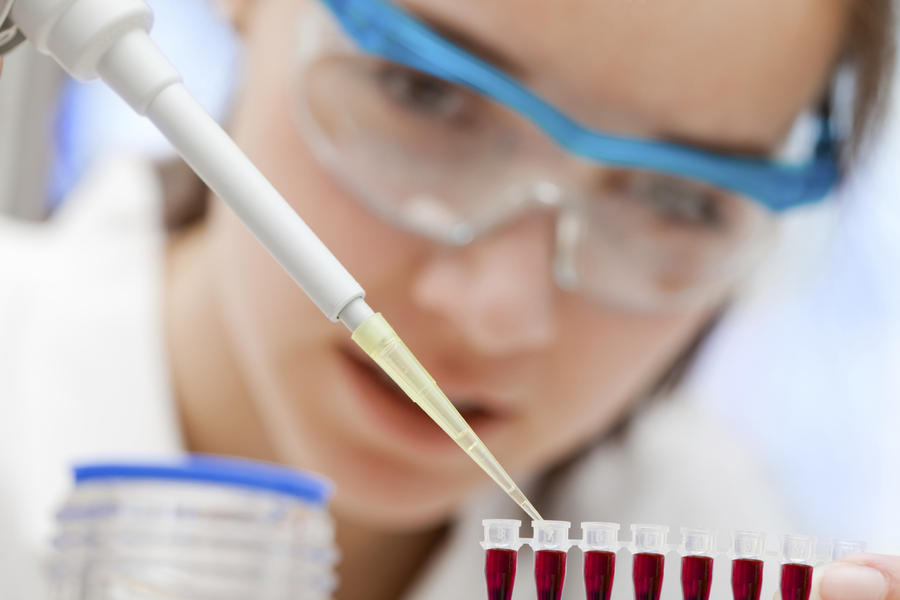Researchers could soon formulate a blood test that helps with early Alzheimer's diagnosis


A free daily email with the biggest news stories of the day – and the best features from TheWeek.com
You are now subscribed
Your newsletter sign-up was successful
Researchers have discovered 10 proteins in blood that might be able to predict Alzheimer's, and even form the basis for a blood test that could diagnose the disease before symptoms start.
In a study published in Alzheimer's & Dementia: The Journal of the Alzheimer's Association, researchers from King's College London were able to accurately predict Alzheimer's disease nearly nine times out of 10. More than 1,100 people participated in the study, and researchers found that 16 of the 26 proteins associated with Alzheimer's were closely tied to the brain shrinkage found in a person with mild cognitive impairment and Alzheimer's. Researchers ran more tests, and found that 10 proteins could be markers that mild cognitive impairment will develop into Alzheimer's.
Looking at these protein levels, researchers were able to correctly predict Alzheimer's disease in 87 percent of the cases. The goal now is to use the information gleaned from the study to create a blood test that could diagnose Alzheimer's early, when medications should have the biggest effect, and treat it before symptoms even begin.
The Week
Escape your echo chamber. Get the facts behind the news, plus analysis from multiple perspectives.

Sign up for The Week's Free Newsletters
From our morning news briefing to a weekly Good News Newsletter, get the best of The Week delivered directly to your inbox.
From our morning news briefing to a weekly Good News Newsletter, get the best of The Week delivered directly to your inbox.
"You take a drug, and in effect you would have the clinical symptoms prevented — even if the disease has already started in your brain," Oxford's Simon Loveston, the study's senior author, told CBS News. Such a breakthrough would be huge: 5.1 million Americans have Alzheimer's, and the rates are expected to triple by 2050. Every year, an estimated $215 billion is spent in the U.S. on Alzheimer's disease and other forms of dementia.
A free daily email with the biggest news stories of the day – and the best features from TheWeek.com
Catherine Garcia has worked as a senior writer at The Week since 2014. Her writing and reporting have appeared in Entertainment Weekly, The New York Times, Wirecutter, NBC News and "The Book of Jezebel," among others. She's a graduate of the University of Redlands and the Columbia University Graduate School of Journalism.
-
 How the FCC’s ‘equal time’ rule works
How the FCC’s ‘equal time’ rule worksIn the Spotlight The law is at the heart of the Colbert-CBS conflict
-
 What is the endgame in the DHS shutdown?
What is the endgame in the DHS shutdown?Today’s Big Question Democrats want to rein in ICE’s immigration crackdown
-
 ‘Poor time management isn’t just an inconvenience’
‘Poor time management isn’t just an inconvenience’Instant Opinion Opinion, comment and editorials of the day
-
 Trump HHS slashes advised child vaccinations
Trump HHS slashes advised child vaccinationsSpeed Read In a widely condemned move, the CDC will now recommend that children get vaccinated against 11 communicable diseases, not 17
-
 FDA OKs generic abortion pill, riling the right
FDA OKs generic abortion pill, riling the rightSpeed Read The drug in question is a generic version of mifepristone, used to carry out two-thirds of US abortions
-
 RFK Jr. vaccine panel advises restricting MMRV shot
RFK Jr. vaccine panel advises restricting MMRV shotSpeed Read The committee voted to restrict access to a childhood vaccine against chickenpox
-
 Texas declares end to measles outbreak
Texas declares end to measles outbreakSpeed Read The vaccine-preventable disease is still spreading in neighboring states, Mexico and Canada
-
 RFK Jr. shuts down mRNA vaccine funding at agency
RFK Jr. shuts down mRNA vaccine funding at agencySpeed Read The decision canceled or modified 22 projects, primarily for work on vaccines and therapeutics for respiratory viruses
-
 Measles cases surge to 33-year high
Measles cases surge to 33-year highSpeed Read The infection was declared eliminated from the US in 2000 but has seen a resurgence amid vaccine hesitancy
-
 Kennedy's vaccine panel signals skepticism, change
Kennedy's vaccine panel signals skepticism, changeSpeed Read RFK Jr.'s new vaccine advisory board intends to make changes to the decades-old US immunization system
-
 Kennedy ousts entire CDC vaccine advisory panel
Kennedy ousts entire CDC vaccine advisory panelspeed read Health Secretary RFK Jr. is a longtime anti-vaccine activist who has criticized the panel of experts
